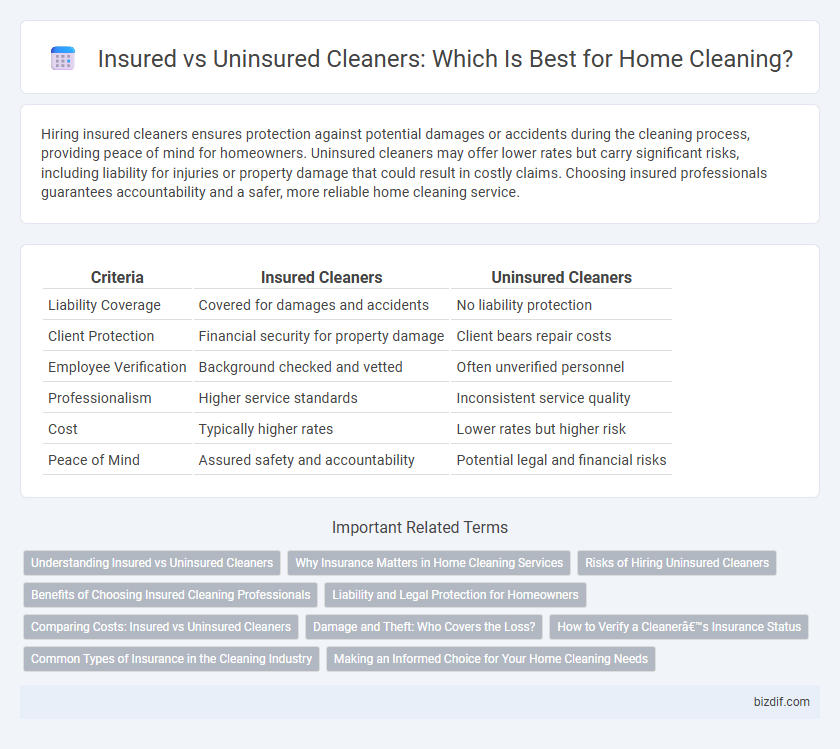Hiring insured cleaners ensures protection against potential damages or accidents during the cleaning process, providing peace of mind for homeowners. Uninsured cleaners may offer lower rates but carry significant risks, including liability for injuries or property damage that could result in costly claims. Choosing insured professionals guarantees accountability and a safer, more reliable home cleaning service.
Table of Comparison
| Criteria | Insured Cleaners | Uninsured Cleaners |
|---|---|---|
| Liability Coverage | Covered for damages and accidents | No liability protection |
| Client Protection | Financial security for property damage | Client bears repair costs |
| Employee Verification | Background checked and vetted | Often unverified personnel |
| Professionalism | Higher service standards | Inconsistent service quality |
| Cost | Typically higher rates | Lower rates but higher risk |
| Peace of Mind | Assured safety and accountability | Potential legal and financial risks |
Understanding Insured vs Uninsured Cleaners
Insured cleaners provide financial protection against damages, theft, or injuries that may occur during home cleaning, ensuring peace of mind for homeowners. Uninsured cleaners pose a higher risk, as any accidents or damages would be the homeowner's responsibility, potentially leading to costly liabilities. Choosing insured cleaners guarantees coverage and accountability, essential for a trustworthy and secure home cleaning service.
Why Insurance Matters in Home Cleaning Services
Insurance in home cleaning services protects homeowners from potential liabilities arising from accidents or damages during the cleaning process. Insured cleaners provide financial security, covering costs related to property damage, theft, or injuries that could otherwise result in out-of-pocket expenses for clients. Choosing insured cleaning professionals ensures peace of mind and upholds accountability, making it a critical factor in selecting reliable home cleaning services.
Risks of Hiring Uninsured Cleaners
Hiring uninsured cleaners exposes homeowners to significant risks, including liability for accidents or injuries occurring on the property during cleaning. Without insurance, any property damage or theft caused by the cleaner may result in out-of-pocket expenses for compensation. Uninsured cleaners also limit legal recourse options, increasing financial and security vulnerabilities for clients.
Benefits of Choosing Insured Cleaning Professionals
Choosing insured cleaning professionals ensures protection against property damage and personal injury, providing peace of mind during home cleaning services. Insured cleaners are often vetted and adhere to higher industry standards, which guarantees reliability and professionalism. This coverage also minimizes financial liability for homeowners in case of accidents, making insured cleaners a safer and more responsible choice.
Liability and Legal Protection for Homeowners
Hiring insured cleaners provides homeowners with essential liability coverage that protects against potential damages or accidents during cleaning services. Uninsured cleaners leave homeowners vulnerable to legal claims, as they may be held financially responsible for injuries or property damage. Ensuring cleaners are insured offers legal protection and peace of mind, minimizing risks associated with home cleaning.
Comparing Costs: Insured vs Uninsured Cleaners
Insured cleaners typically charge higher rates, reflecting the cost of liability and worker's compensation coverage that protects both the client and the cleaner from potential damages or accidents. Uninsured cleaners may offer lower prices, but this saves the risk of being liable for any injuries or property damage that occurs during the cleaning service. Choosing insured cleaners often provides financial security despite a higher upfront cost, while uninsured options may incur hidden expenses due to lack of coverage.
Damage and Theft: Who Covers the Loss?
Insured cleaners provide financial protection by covering damages or theft occurring during the home cleaning process, ensuring homeowners are not held liable for repair or replacement costs. Uninsured cleaners leave homeowners vulnerable to out-of-pocket expenses if valuables are lost or property is damaged. Choosing insured cleaning services mitigates risks and guarantees compensation in cases of accidental harm or theft.
How to Verify a Cleaner’s Insurance Status
Verify a cleaner's insurance status by requesting a copy of their valid insurance certificate, which should clearly list their name, policy number, coverage period, and insurance company details. Contact the insurance provider directly to confirm the authenticity and current status of the policy, ensuring protection against potential damages or liabilities during the cleaning service. Cross-checking online databases or platforms that certify insured professionals can provide additional assurance of the cleaner's coverage and reliability.
Common Types of Insurance in the Cleaning Industry
Insured cleaners typically carry general liability insurance, workers' compensation, and bonding coverage, which protect both clients and employees from potential accidents, property damage, or theft during cleaning services. Uninsured cleaners lack these protections, leaving homeowners vulnerable to financial loss or legal liabilities if injuries or damages occur. Understanding the presence of insurance policies like commercial general liability and bonded worker coverage is crucial when selecting a professional cleaner for safe and secure service.
Making an Informed Choice for Your Home Cleaning Needs
Choosing insured cleaners for your home cleaning services provides protection against potential damages or accidents, ensuring you are not financially liable. Insured professionals have undergone background checks and adhere to industry standards, offering peace of mind and reliable service quality. Hiring uninsured cleaners may save costs upfront but poses risks such as unverified reliability, lack of compensation coverage, and potential legal complications.
Insured cleaners vs Uninsured cleaners Infographic

 bizdif.com
bizdif.com